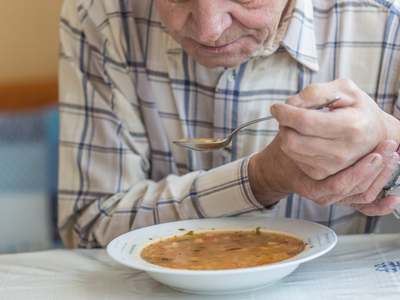A friend and caregiver I know was driving home from helping an elderly gentleman in a nearby community when she received a call from a woman in search of in-home care, companionship, and transportation assistance for her father who has Parkinson’s disease.
My friend knew the prominent family and she really wanted to help them, but her schedule would not permit it. Instead, she referred them to Home Helpers because she knew we could provide specialized care services for patients with Parkinson’s disease in Clearwater.
What is Parkinson’s disease?
The National Institutes of Health define Parkinson’s disease as a brain disorder that causes uncontrollable movements, shaking, tremors, stiffness, and difficulty with balance and coordination. Parkinson’s occurs when the brain cells that make dopamine, a chemical that helps control movement, cease to function or die.
“Parkinson’s Disease (PD) is the second most common degenerative neurological disorder after Alzheimer’s disease. It is estimated that PD affects 1 percent of the population over the age of 60,” explains the Parkinson’s Association of Southwest Florida (PASF), which provides free services and programs that improve the quality of life for persons with Parkinson’s Disease and their care partners.
In 2021, PASF reported that Florida ranked #1 nationally for the highest percentage of the population with PD, and our beautiful Sunshine State ranked #2 nationally for the highest number of people diagnosed with PD, which at that time stood at 64,000.
What causes PD?
According to the Michael J. Fox Foundation for Parkinson’s Research, “Researchers believe that in most people, Parkinson’s is caused by a combination of environmental and genetic factors.”
What are the symptoms of PD?
Symptoms vary from patient to patient, as does the degree of severity, and they include movement or motor symptoms, as well as non-movement, (non-motor) symptoms that are referred to as “invisible.”
Movement or motor symptoms include:
- Slowness of movement (bradykinesia)
- Stiffness (rigidity)
- Resting tremor
- Difficulties walking
- Problems with balance and coordination
Non-movement or non-motor symptoms include:
- Constipation
- Depression
- Memory problems
- Difficulties sleeping
“It's important to remember that even if you experience symptoms common among people with Parkinson’s, they may be from a completely different condition. Read more about Parkinson’s symptoms or take the Parkinson’s Screening Questionnaire to see if you should speak to your doctor or a movement disorder specialist about PD,” suggests the Michael J. Fox Foundation.
Are there ways to slow PD progression?
The Parkinson’s Foundation, another non-profit organization researching PD, sheds some light, “Parkinson's symptoms can impact your life in numerous ways. Using a range of therapies and supports as needed can make all the difference. Personalized medicines, social support groups, mental health care and participation in clinical trials have all shown benefits to people with Parkinson's. While scientists are evaluating everything from medications to mindfulness practice for clues (to slowing the progression of PD), they've discovered some of the biggest benefits start at home.”
Their primary suggestions for slowing the advancement of PD are eating a nutritious plant-based diet and participating in regular exercise routines.
“Eating a whole-food, plant-based, Mediterranean-style diet — including fresh vegetables, fruit and berries, nuts, seeds, fish, olive and coconut oils, and more — may be linked to slower PD progression.
“When you live with PD, exercise is also critical to optimal health. In fact, the Parkinson’s Outcomes Project shows at least 2.5 hours a week of physical activity can slow PD symptom progression. Research reveals regular exercise also shows neuroprotective effects in animal models with Parkinson's,” says the Parkinson Foundation.
April is Parkinson’s Awareness Month, so I am especially thankful for the timely referral from my friend to help the man with PD, and my team has scheduled a FREE consultation to assess his and his family’s specific needs. After determining what in-home care services are needed, such as companionship, meal planning and preparation, exercise support, personal care, or respite for family caregivers, I will match the perfect caregiver who is the most highly skilled and trained in specialized Parkinson’s care to assist him and his family.
We, at Home Helpers® Clearwater, are honored to have been ranked among the Home Care Pulse Top 100 Leaders in Experience for home care providers in 2023 and to have received the Best of Home Care® Provider of Choice Award 2023, the Best of Home Care® Employer of Choice Award 2023, and the Best of Home Care® Leader in Experience Award 2023.
We proudly serve male and female seniors in Clearwater, Dunedin, Palm Harbor, Safety Harbor, Tarpon Springs, Holiday, New Port Richey, Trinity, Port Richey, Hudson, and surrounding areas. Home Helpers®…we are Making Life Easier℠ 727.942.2539
Sources:

